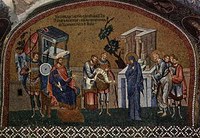Nativity, Historicity and Atheistic Simplification
Kevin Moss | 21:15, 23rd December 2013
It is an intriguing dilemma when one finds so much to value in a person, whilst utterly rejecting his or her polemic. For example, I found his final work 'Mortality' honest and compelling in many respects.
 But that does not mean that I agreed with him when he was wrong, and to be fair he demonstrated a somewhat unerring instinct for error whenever he put his hand to treating with the biblical accounts.
But that does not mean that I agreed with him when he was wrong, and to be fair he demonstrated a somewhat unerring instinct for error whenever he put his hand to treating with the biblical accounts.
Hitchens, true to form, takes a pop at the Gospel narrative (Luke 2) which deals with the chronological and geographical context for the birth of Christ at Bethlehem, concluding "This is, all of it, quite evidently, a garbled and oral-based reconstruction undertaken some considerable time after the 'fact'." (2007, God is Not Great, p 112). Clearly, at this time of the year, the matter is not of insignificance for Christians as we remember the coming of Immanuel, God with us. There is little benefit to anyone in embracing a mythology which either floats entirely free of real history, or instead plays fast and loose with the known facts.
Of course, Hitchens is wrong on several levels – not that this fact will matter to many of the atheist faithful who will swallow such assertions whole without chewing them over first. There is the simple dating issue firstly: if we may reasonably establish a dating for the Book of Acts at around AD 62 (and we may), then clearly Luke's Gospel narrative must have been written earlier. It therefore does not allow for the passage of time which Hitchens' criticism assumes. But there is something even more critical going on here: Luke is generally recognised as an assiduous and careful historian – if he provides a chronological context, then it’s not unreasonable to assume he has a good reason for it. Especially when Luke himself refers to the later Census under Quirinius (AD 6) in Acts 5 – he is not confusing his dates. In the Gospel account, Luke is referring to an event other than the Census in AD 6 – rather than simply confusing two events.
You would not realise this from Hitchens' polemic. Nor would you from Richard Dawkins’ equivalent (2006, The God Delusion, p93). Nor from Dan Barker (2008, Godless, p266). The depressing thing is that the biblical scholar F. F. Bruce had dealt very effectively with this argument about dating as far back as 1943, forcing one to the conclusion that this particular cabal of atheists are not inclined to let the data get in the way of a bad argument. One wonders just how much respect they actually have for their readership, if they expect them to swallow this stuff in a kind of credulous, unthinking manner - or perhaps they genuinely believe that simply requoting each other’s flawed arguments suddenly makes them intellectually viable.
In fact, the most natural explanation for Quirinius’ role leading military expeditions in the eastern provinces prior to Christ’s birth, was that he did actually have some type of 'governor' role. Luke very carefully uses a general Greek term to describe this role – and Luke is extremely specific in his use of titles. We know that Herod died in 4 BC, by which time Jesus would have been born, allowing for an earlier census to have taken place. We know that Emperor Augustus placed a great deal of confidence in Quirinius, and a Latin inscription discovered in 1764 tells us that he served as governor of Syria on two separate occasions.
The good news of Christmas, is that the God of eternity breaks into human history, in the real, physical person of Jesus of Nazareth. It's a historical event, not some loosely reconstructed mythology – and where Luke touches on the actual events, we may quite reasonably rely on his narrative.
Document Actions

